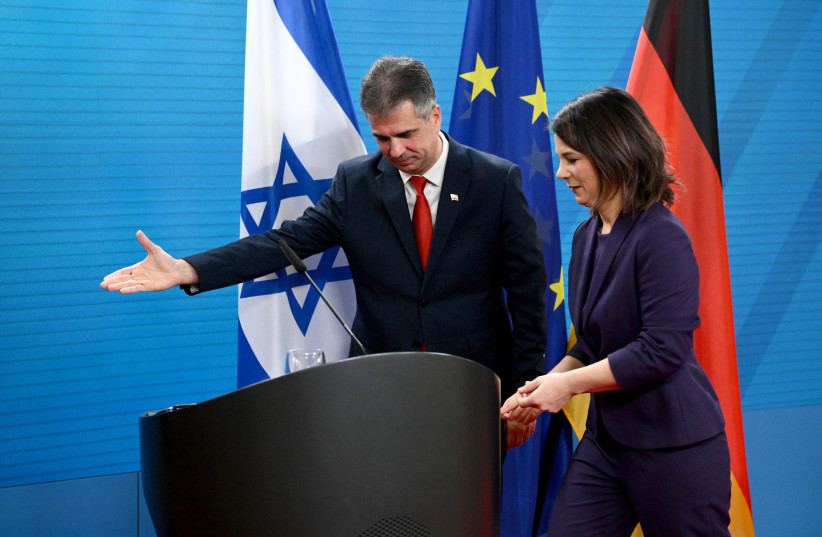German FM: Israeli death penalty legislation is a major mistake

“I do not want to hide the fact that we here abroad do have concerns regarding some legislative projects in Israel," Baerbock told Cohen.
It would be a major mistake for Israel to adopt capital punishment for terrorists, German Foreign Minister Annalena Baerbock told her Israeli counterpart Eli Cohen in Berlin in advance of the Knesset’s preliminary vote on the matter on Wednesday.
“We oppose the death penalty from the depth of our beliefs and we raise that issue everywhere we go in the United States and Japan, just as much as in Saudi Arabia and Iran,” she said.
Many countries are ending that cruel practice which does not sufficiently act as a deterrent, Baerbock stated.
She recalled that Israel is known for its opposition to capital punishment and has used the death penalty only once in its history, and that was against the German Nazi Adolf Eichmann who was a critical architect of the final solution.
Even school children know about the Eichmann example and learn that Israel does not support the death penalty even in cases of terror, she said.
“This has always been an impressive argument” that could be used by “those of us who defend Israel against unjustified criticism on the international scene,” she said.
“I speak as a friend when I say that I am convinced it would be a major mistake to break with this tradition,” she said.
Barbock raises concern about Israeli judicial reform
Baerbock also raised the issue of Israel’s pending judicial overhaul, a reform process that Western allies worry could weaken Israeli democracy.
“I do not want to hide the fact that we here abroad do have concerns regarding some legislative projects in Israel. Amongst the values that we shared are the principles of the rule of law, such as an independent judiciary,” she said.
Democracy “has always been a strong aspect and characteristic of Israel,” she said.
Cohen pushed back and said he believed it would strengthen the Israeli democracy not weaken it.
“Israel is a vibrant democracy” where “people can say whatever they think, anytime, whenever they want” and this will not change, he said.
He underscored his trip to Kyiv earlier in the month, adding that he was first high-level Israeli and Middle East official to make the trip since the war started last year.
While in Kyiv, he spoke passionately about the suffering of the Ukrainian people but did speak about Russia. In Berlin, however, he condemned the Russian “aggression” against Ukraine.
Cohen said he had invited Germany to be more actively involved in the Abraham Accords through which Israel had normalized ties with four Arab countries. Cohen said he believed another two or three Middle East nations could sign that agreement.
He had hoped to focus the trip on Israel’s push to solidify a common position with its Western allies against Iran, a move that is now possible given Iran’s execution of protestors and its enrichment of uranium at 84%, a step that brings it close to the 90% needed to produce a nuclear bomb.
“The international community can never accept a nuclear Iran,” he said, in advance of the International Atomic Energy Agency’s board meeting in Vienna next week. Germany is one of 35 IAEA board members.
Cohen urged Germany to designate the Islamic Revolutionary Guard Corps as a terror organization, something that Berlin and the European Union have refused to do pending a ruling on the matter by the European court.
“Iran is like cancer. It finances Hamas, the Islamic Jihad and Hezbollah,” Cohen said.
“We are also aware that a few days ago, the antisemitic Iranian regime imposed sanctions on German Jewish leaders and local organizations. We all know what signaling out Jews means,” he said.
Germany and Israel have to fight this together, he said.
Baerbock also spoke out about Germany’s concerns about Iran, noting that its “support of militant groups threatens the stability and security in the Middle East.”
Her country, she said, shared Israel’s concern about Iran’s nuclear escalation, especially the reports regarding the 84% enrichment of uranium for which there was “no plausible civilian justification.”
“Iran must not acquire a nuclear bomb... the consequences of such an escalation would have a devastating effect on the region as a whole,” she said, adding that the international community must speak in one voice against Terhan.
Jerusalem Post Store
`; document.getElementById("linkPremium").innerHTML = cont; var divWithLink = document.getElementById("premium-link"); if (divWithLink !== null && divWithLink !== 'undefined') { divWithLink.style.border = "solid 1px #cb0f3e"; divWithLink.style.textAlign = "center"; divWithLink.style.marginBottom = "15px"; divWithLink.style.marginTop = "15px"; divWithLink.style.width = "100%"; divWithLink.style.backgroundColor = "#122952"; divWithLink.style.color = "#ffffff"; divWithLink.style.lineHeight = "1.5"; } } (function (v, i) { });

